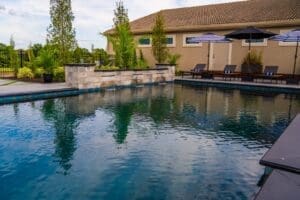Our region’s summer season is usually long and hot, and this can put quite a bit of stress on our trees, shrubs, and flowers. Typically, the Kansas City area doesn’t experience a sufficient amount of precipitation for plants to thrive. Adding mulch or landscape rock around your trees and over your flowerbeds has several benefits, including:
- Natural material that acts as a groundcover, helping to retain moisture
- Insulates the soil, protecting from both cold and excessive heat
- Helps to keep weeds from taking hold
- Helps to prevent or reduce erosion
- Adds visual appeal to your landscape
Determining whether to use mulch or rock is an integral part of any landscaping plan. More than just a matter of personal taste, design aesthetics—while important—should be a secondary consideration. Your focus should be on how to ensure that each plant you choose for your landscaping can thrive. Mulch and landscape rock or decorative gravel each come with advantages and disadvantages when it comes to functionality.
Mulch
Technically, the term “mulch” applies to any material spread over top of the soil in a planted area. However, we’ll discuss landscape rock and decorative gravel separately from organic mulches that are made from tree materials. We’ve outlined the pros and cons of wood chip mulch into this summary:
Mulch Pros
- Promotes Growth: The addition of mulch to your planting beds significantly increases growth rates.
- Reduces Water Usage: Mulch reduces the evaporation of water, so you don’t have to water as much, which saves you time and money.
- Provides Nutrients: Mulch contains nutrients that find their way into the soil and enhance the health of your plants.
- Discourages Weeds: Mulch makes it hard for weeds to sprout, resulting in far fewer weeds.
- Regulates Temperature: Mulch acts as a temperature regulator and helps to keep plants cooler in the summer and warmer in the winter.
- Slows Compaction: The presence of mulch tends to discourage people from walking on it, and this means less soil compaction.
- Slows Erosion: It only takes a thin layer of mulch to significantly slow erosion throughout your landscape.
Mulch Cons
- Frequent Replacement Requirements: Although some types of mulch are more durable than others, most need to be replaced after one to four years. The recurring cost can add up, and the task takes time.
- Too Much or Not Enough: Getting your mulch layer’s thickness right is crucial. Any more than two or three inches can cause your plants to struggle.
- Timing is Everything: Adding mulch too early can prevent your plants from blooming on time. Adding it too late can reduce its effectiveness as a weed inhibitor.
- Risks of Unwelcome Seeds: Organic mulch sometimes has a few seeds mixed in with it unintentionally.
Landscape Rock
Landscape rock or decorative gravel can be a beautiful addition to your landscape, but like mulch, rock has both benefits and drawbacks, such as:
Rock Pros
- Easy Care: Rocks almost never need to be replaced; they’re extremely durable.
- Lower Long-Term Cost: Since rocks last so long, the cost works out to less than mulch over time.
- Nonflammable: If there’s ever a fire on your property, rocks beat mulch.
- Excellent Weed Prevention: Like mulch, rocks repel weeds, but for longer. It’s more difficult for weeds to grow through rocks than mulch.
- Superior Wind Resistance: Rocks offer excellent protection from soil erosion, and they won’t blow away like mulch can in extreme winds.
- Rock Gardens: A rock garden can look great on its own, even without plants!
Rock Cons
- Heat Retention: Some types of rocks are a bit too proficient at heat retention, raising the temperature of the soil to levels that can stress your plants.
- Devoid of Nutrients: Rocks don’t provide the nutrients that mulch can, so they don’t offer any improvement to your soil.
- Alkaline vs. Acidic: Rocks make the soil more alkaline than acidic, but most trees do better in acidic soil.
- Eventual Weeds: Blown in by the wind, enough soil will eventually accumulate in between rocks to allow some weeds to develop. Rocks make them harder to remove.
- Pruning Difficulty: Rocks can contribute to irregular shrubs by interfering with rejuvenation pruning.
- Removal: If you decide to remove them, rocks are much heavier than mulch, and the task is a lot more work.
Which is the Right Choice for Your Kansas City Landscape?
Every landscape is unique, and while mulch is a popular option, rocks can provide benefits that mulch cannot.
After reviewing the information outlined here, if you’re still not sure whether mulch or rock would be best suited to your landscaping, we can help. With some designs, a landscape can benefit from a combination of both mulch and rock. The experts at our Kansas City landscape company can help you determine the right option for your unique landscape.
If you’re ready to achieve award-winning landscapes, and you want to work with a Kansas City landscape company that prides itself on customer satisfaction, contact High Prairie Outdoors today.



